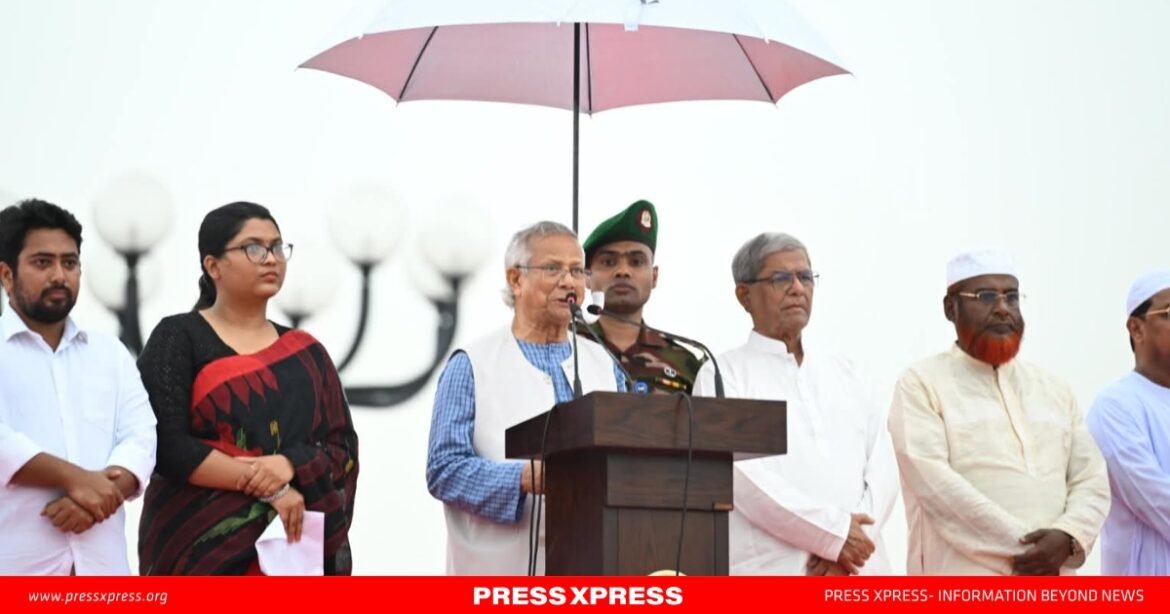Following the punctured National Citizen Party (NCP) rally at Central Shaheed Minar on August 3, the government’s July Declaration event on Manik Mia Avenue saw a disappointing turnout on Tuesday, despite the aggressive attitude with lavish state spending amounting to millions from the public exchequer.
Muhammad Yunus, the self-proclaimed chief adviser of the unconstitutional interim government, presented the 28-point declaration at the National Parliament building in front of poorly poured down several hundred guests, mostly from the pet political party leaders and diplomats who had supported last year’s Jamaat-backed student movement.
Notably, NCP convener Nahid Islam represented the party, while with a mysterious drama other top leaders, including Nasiruddin Patwary, Hasnat Abdullah, Sarjis Alam, and Tasnim Jara, reportedly traveled to Cox’s Bazar after learning that the declaration omitted their demand for the Second Republic.
Abdul Hannan Masud, NCP’s Senior Joint Chief Coordinator, declared a boycott the day before the event, criticizing the government’s failure to invite 158 coordinators and co-coordinators of the July movement. He expressed concerns about whether families of martyrs would even be acknowledged, as they had been sidelined in less than a year.
Media reports earlier claimed former US Ambassador Peter Haas was meeting NCP leaders in Cox’s Bazar. However, NCP Joint Convener Khaled Saifullah dismissed these reports as “propaganda,” while Patwary called the meeting a mere rumor. The Bangladesh embassy in Washington confirmed that Peter Haas was in the US on Tuesday.
A Distorted Narrative
Political analysts, journalists, and pro-liberation activists have slammed the declaration, accusing Yunus of distorting history, glorifying jihadists and terrorists, and promoting impunity for the killers while demonizing the Awami League, Bangabandhu, and Sheikh Hasina.
The declaration claims that the anti-government movement will be enshrined in the state’s constitutional framework and that it will be included in the revised Constitution following the next election. According to political observers, this is a move orchestrated by BNP-Jamaat elements.
Yunus falsely claimed that on August 5, Sheikh Hasina was forced to resign and flee the country, when, in fact, she was flown to India aboard an Armed Forces aircraft after her resignation was not tendered. The declaration further distorts the goals of the Anti-Discrimination Student Movement (ADSM), which, in reality, sought only to reform the quota system, particularly reducing the quota for family members of freedom fighters, not to tackle corruption.
The declaration falsely asserts that over 1,000 people were killed during the student uprisings, citing conflicting reports, including a UN-backed figure of 1,400 deaths, which has been widely criticized as exaggerated. The actual figure reported by the government is 834, including “fake martyrs.”
Yunus also acknowledged the Bangladesh Army’s involvement during the upheaval but portrayed its inaction as support for the people’s “democratic struggle.” In reality, military support was non-existent prior to August 1, when the government banned the Jamaat-Shibir radicals.
The declaration goes on to call the 12th parliament “illegal” and claims it was dissolved “as per the demands of the people.” In truth, this parliament was constitutional, received international support, and was dissolved by the president on August 5 under duress.
Yunus also misrepresented the formation of the interim government, claiming it was in accordance with Article 106 of the Constitution, when, in fact, the procedure was not followed correctly, leading to the forgery of the chief justice’s signature.
The Irony of Yunus’s Claims
Yunus has consistently promised democratic reforms and good governance, yet his declaration sharply contrasts with the reality of his leadership, which has been marred by corruption, violence, and the suppression of dissent. His regime has been accused of mob violence, corruption, nepotism, and the looting of public assets, primarily targeting Awami League leaders, activists, and their supporters.
The declaration falsely claims that the Yunus-led government will swiftly bring justice to crimes committed during the Awami League government’s tenure. However, given the absence of rule of law under Yunus’s government, it seems unlikely that justice will ever be delivered.
While Yunus promises a society based on the rule of law, human rights, and democratic principles, the reality is starkly different. Under his government, the judiciary is compromised, the police are forced to fabricate charges, and the political system remains deeply polarized.
The Historical Distortion
Yunus’s declaration also includes blatant distortions of historical facts. It falsely criticizes the post-independence Awami League government and undermines the achievements of the Liberation War. He selectively omits Bangabandhu Sheikh Mujibur Rahman’s contributions to the independence struggle and falsely attributes blame for a supposed failure to implement the people’s aspirations during the Liberation War.
Yunus also distorts the historical significance of the Baksal system, which was intended to unify the nation amid economic crisis, foreign conspiracies, and domestic violence. Far from being a “one-party” system, Baksal was meant to facilitate power decentralization and promote self-sufficiency in agriculture and industry.
Despite these distorted narratives, the July Declaration claims to uphold the spirit of the Liberation War and the aspirations of the people of Bangladesh. However, Yunus’s selective omissions and fabrications only serve to undermine the values of freedom, justice, and democracy for which the nation fought.
Conspiracy or Revolution?
Yunus’s attempt to rewrite history reflects a deeper agenda, shaped by foreign and domestic conspiracies aimed at destabilizing Bangladesh’s democratic institutions. His regime has consistently manipulated historical narratives to serve the interests of anti-liberation forces, leaving the country at risk of falling under the control of factions that seek to undermine its independence and sovereignty.
The July Declaration is not just a political document—it is an effort to legitimize a regime built on lies, distortion, and manipulation. For those who cherish the values of democracy and the sacrifices made during the Liberation War, Yunus’s rhetoric is a dangerous step backward.


